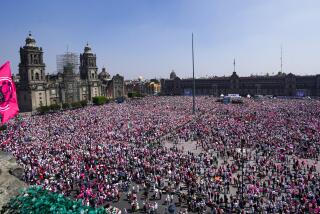5,000 March for Reform in Taiwan : Protest: Opposition party demonstrators demand direct presidential elections.
TAIPEI, Taiwan — The opposition Democratic Progressive Party launched a three-day series of demonstrations Sunday to press for a constitutional amendment that would provide for direct presidential elections.
About 5,000 protesters marched through the streets of Taipei in a light rain for three hours Sunday afternoon, chanting slogans demanding constitutional reform and the release of political prisoners. Most marchers then gathered in a sports stadium for an evening rally. Police had issued permits and there were no reports of violence.
“What they’re demanding is real democracy, not phony democracy,” declared Lin Sheng-ting, 47, a bystander who said he supports the opposition. “They’re always making sacrifices. They don’t fear being arrested. They’re always struggling. They have a great democratic spirit.”
Demonstrations were also staged Sunday in about 20 other cities across Taiwan, according to Hsu Hsin-liang, chairman of the Democratic Progressives. The opposition plans to bus supporters from around the island to Taipei for a unified demonstration here today, then continue with a third day of protests Tuesday, Hsu said.
“The goal of our demonstration is to let people show their support for direct presidential elections,” Hsu stressed. “It is quite clear that the people’s wish, their expectation, has been let down by the Nationalist Party.”
Taiwan’s National Assembly is in the midst of a special 70-day session called to make revisions to the island’s constitution, which was written in the late 1940s when the Nationalist Party governed all of China. The key issue before the assembly is whether presidential elections should be carried out by direct popular vote or by an electoral college system.
Taiwan’s current all-China constitution was frozen into place when Chiang Kai-shek fled here with his government in 1949 after losing a civil war to the Communists on the Chinese mainland. It provides for the National Assembly to choose the president.
The ruling Nationalist Party controls nearly 80% of Assembly seats, giving it the power to impose constitutional revisions at will. The Nationalists, however, are split between a faction favoring direct presidential elections and one favoring retention of an electoral college system. Taiwan-born President Lee Teng-hui favors direct elections, but he is opposed by powerful conservatives, most of whom were born on the Chinese mainland.
More to Read
Sign up for Essential California
The most important California stories and recommendations in your inbox every morning.
You may occasionally receive promotional content from the Los Angeles Times.










